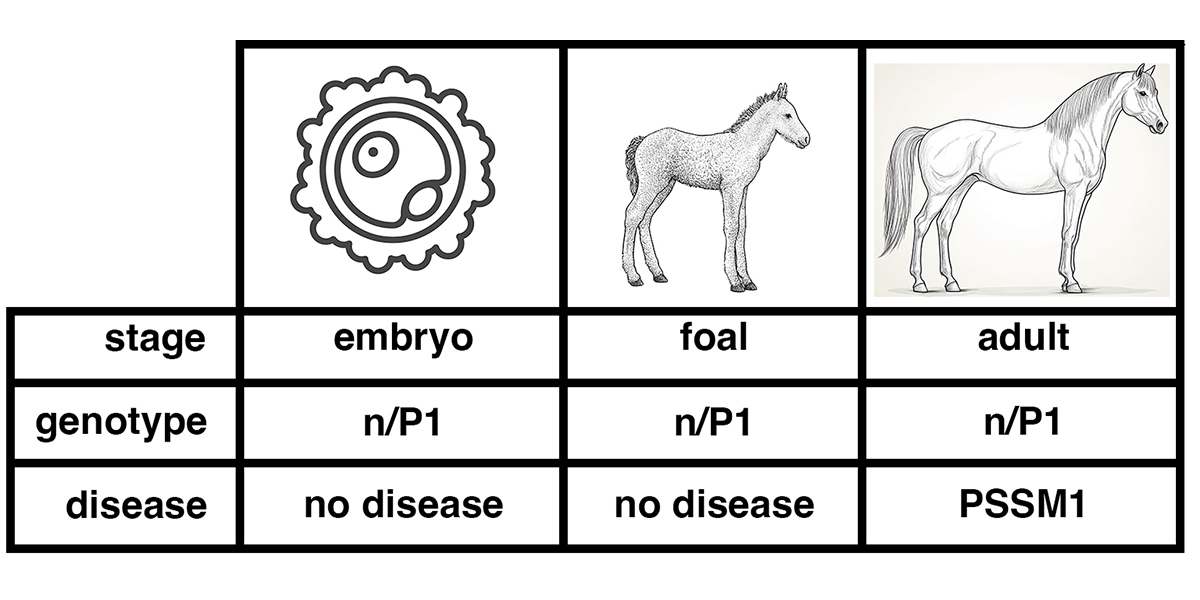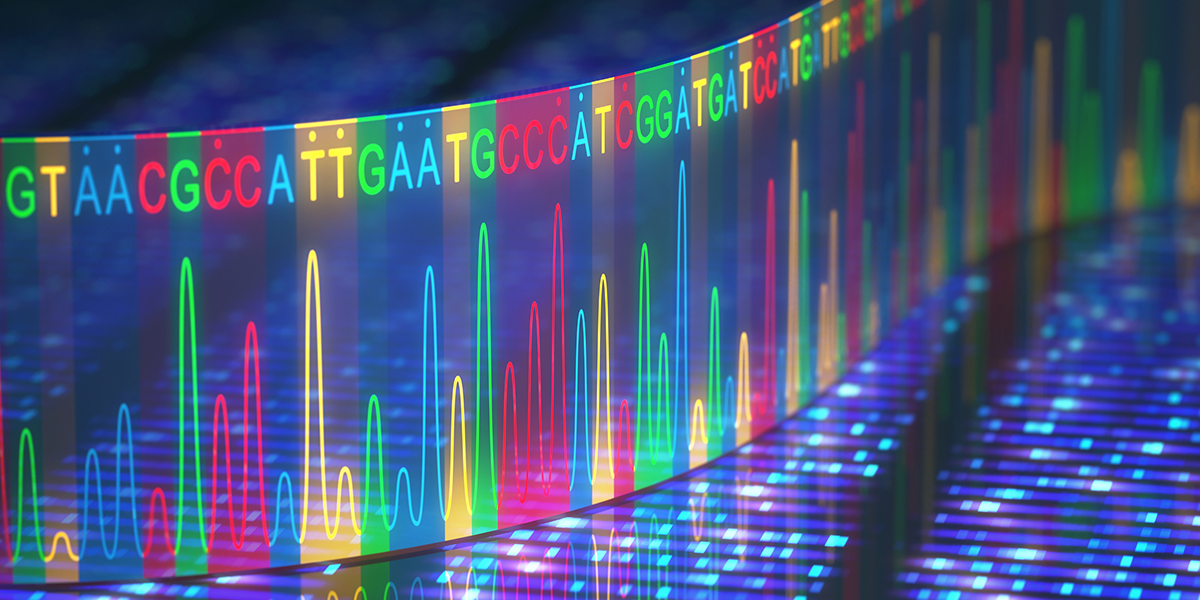Our blog
Resources and insights
The latest industry news, interviews, technologies, and resources.
Blog categories
Blog
P4 Allele of MYOZ3
IntroductionThis blog post explores the P4 allele (S42L) of the equine MYOZ3 gene, which encodes myozenin 3. Portions of this blog post serve as additional sources of information to supplement the MYOZ3 Gene Page.We present data to support the hypothesis that the P4 allele of MYOZ3 (S42L) is damaging.The substitution of leucine (hydrophobic) for serine (polar uncharged) in the P4 allele of MYOZ3 is a nonconservative substitution of a chemically dissimilar amino acid. Evolutionary conservation provides convincing evidence that the P4 allele of MYOZ3 is damaging. We use public data to show that the reference allele is completely conserved across 448 species of mammals and birds representing 155 unique sequences of the 41-amino acid query sequence centered on the S42L allele, covering over 310 million years of evolutionary history. P4 allele of equine MYOZ3Evolutionary conservation provides evidence on whether the P4 allele of MYOZ3 is damaging. In this approach, predicted MYOZ3 protein sequences are compared among a number of different species. This method, applied to mammals and birds, is shown below.A 41 amino acid segment of the protein sequence of equine MYOZ3 (XP_005599348.1), centered on the position of the variant, is shown below. This sequence is compared to a segment of the protein sequence of…
Blog
P2 Allele of MYOT
Introduction This blog post explores the P2 allele (S232P) of the equine MYOT gene, which encodes myotilin. Portions of this blog post serve as additional sources of information to supplement the MYOT Gene Page. We present data to support the hypothesis that the P2 allele of MYOT (S232P) is damaging. The substitution of proline (heterocyclic) for serine (polar uncharged) in the P2 variant of MYOT is a nonconservative substitution of a chemically dissimilar amino acid. Evolutionary conservation provides convincing evidence that the P2 allele of MYOT is damaging. We use public data to show that the reference allele is widely conserved across most of 244 species of mammals and birds covering over 310 million years of evolutionary history. There is a prominent exception in humans, where the MYOT gene has a conservative amino acid substitution that has gone to fixation (S232T). The substitution of threonine (polar uncharged) for serine (polar uncharged) in human MYOT is a conservative substitution of a chemically similar amino acid. This variant has gone to fixation in all the great apes most closely related to humans (chimp, bonobo, gorilla, and orangutan), but is absent from Old World monkeys, placing the origin in the common ancestor to…
News
Twenty European countries issue patent on EquiSeq DNA tests
ALBUQUERQUE, NEW MEXICO EquiSeq announced today that a group of twenty countries in Europe have issued a patent on EquiSeq’s DNA test for three genetic variants that predispose to muscle disease. The tests are part of EquiSeq’s current DNA panel. Test results allow horse owners to better manage affected horses, and can be used to improve a breeding program to reduce the incidence of muscle disease. The following European countries have issued the patent: Austria, Belgium, Bulgaria, Germany, Denmark, Estonia, Finland, France, Italy, Ireland, Lithuania, Luxemburg, Latvia, Malta, The Netherlands, Portugal, Romania, Sweden, Slovenia and United Kingdom. The patent for EquiSeq’s DNA test has now been issued in 23 countries. The same patent remains pending before patent examiners in Australia and the United States. A second patent is pending in all the same countries. Generatio GmbH performs EquiSeq’s DNA tests for the European Union and United Kingdom, while EquiSeq performs genetic testing for horse owners in the United States and the rest of the world outside of the EU and UK.
News
Jeremy Edwards speaks on intellectual property
Jeremy Edwards, Chair of Department of Chemistry and Chemical Biology at the University of New Mexico, is one of UNM’s most prolific inventors. Dr. Edwards is part of the EquiSeq science team and is an inventor on two of EquiSeq’s patents. In this interview, Dr. Edwards talks about the importance of protecting intellectual property.
News
South Africa issues patent on EquiSeq DNA tests
ALBUQUERQUE, NEW MEXICO EquiSeq announced today that South Africa has issued a patent on EquiSeq’s DNA tests for three genetic variants in horses that predispose to muscle disease. The tests are part of EquiSeq’s current DNA panel. Test results allow horse owners to better manage affected horses, and can be used to improve a breeding program to reduce the incidence of muscle disease. This is the third patent issued to EquiSeq. The same patent remains pending before patent examiners in Australia, the European Union, and the United States. A second patent is pending in the same countries. Generatio GmbH performs EquiSeq’s DNA tests for the European Union and United Kingdom, while EquiSeq performs genetic testing for horse owners in the United States and the rest of the world outside of the EU and UK.
News
New Zealand issues patent on EquiSeq DNA tests
ALBUQUERQUE, NEW MEXICO EquiSeq announced today that New Zealand has issued a patent on EquiSeq’s DNA tests for three genetic variants in horses that predispose to muscle disease. The tests are part of EquiSeq’s current DNA panel. Test results allow horse owners to better manage affected horses, and can be used to improve a breeding program to reduce the incidence of muscle disease. This is the second patent issued to EquiSeq. The same patent remains pending before patent examiners in Australia, South Africa, the European Union, and the United States. A second patent is pending in the same countries. Generatio GmbH performs EquiSeq’s DNA tests for the European Union and United Kingdom, while EquiSeq performs genetic testing for horse owners in the United States and the rest of the world outside of the EU and UK.
News
Canada issues patent on EquiSeq DNA tests
ALBUQUERQUE, NEW MEXICO EquiSeq announced today that Canada has issued a patent on EquiSeq’s DNA tests for three genetic variants in horses that predispose to muscle disease. The tests are part of EquiSeq’s current DNA panel. Test results allow horse owners to better manage affected horses, and can be used to improve a breeding program to reduce the incidence of muscle disease. This is the first patent issued to EquiSeq. The same patent remains pending before patent examiners in Australia, New Zealand, South Africa, the European Union, and the United States. A second patent is pending in the same countries. Generatio GmbH performs EquiSeq’s DNA tests for the European Union and United Kingdom, while EquiSeq performs genetic testing for horse owners in the United States and the rest of the world outside of the EU and UK.
Blog
Genes First!
EquiSeq has released a major revision to the software that powers our website and database. We now present genetic test results starting with the affected gene. Here is an example of the appearance of the new horse profile pages. Figure 1. A horse profile page returning results from EquiSeq. This horse has tested positive for the K1 variant of COL6A3 (n/K1), negative for the other five variants in EquiSeq’s DNA test, and also negative for the P5 and P6 variants of DYSF, an experimental test not available commercially. What is a gene? In the context of mammalian genetics, a gene is a unit of hereditary information made of DNA. These segments of DNA encode proteins. Every mammal has two copies of every gene (except for X-linked genes in males). In a population, there are variant forms of genes, called alleles of that gene, that differ in their DNA sequence. Some alleles produce proteins that differ from the reference or wild-type sequence in minor ways that do not affect protein function. Other alleles produce proteins that are nonfunctional or have an altered function, causing a change in the development or function of the organism. What is a disease state? Disease is defined…
Blog
Study of horse genomes explores genetic burden
A team of researchers at the University of Minnesota and the University of California, Davis, have published a landmark study of the predicted genetic burden in horses, based on the analysis of whole genome sequence data from 605 horses (1). They conclude that the genetic load in horses is 1.4 – 2.6 times that of the human population. The authors discuss the unique advantages of the study of horse to understand human phenotypes, especially those associated with athletic performance.
Horse owners have asked us to explain this paper, as it mentions the genetic variants that are in EquiSeq’s panel of DNA tests. Here we review the methods and major findings of this paper. We include background information typically absent from the primary literature in order to make the paper more accessible to non-specialists.
Blog
What is PSSM?
Polysaccharide Storage Myopathy (PSSM) is a form of equine exercise intolerance characterized by episodes of tying up. Horses with this condition have a particular set of clinical signs, including displays of pain, refusal to move forward, trouble standing for the farrier, and standing “parked out” as if to urinate. All of these are signs of a disease state affecting muscle. Affected horses often show enlarged granules of glycogen in muscle tissue obtained by biopsy. These enlarged glycogen granules are relatively resistant to digestion by amylase, an enzyme that completely degrades normal glycogen granules under standard conditions. Glycogen is a polysaccharide, a polymer of the simple sugar glucose, a monosaccharide. The synthesis of glycogen from glucose in muscle tissue provides a store of energy. When energy is needed, the glycogen is broken down into glucose, which can be metabolized for energy. The image above shows a) the chemical structure of glucose, b) the general structure of glycogen in which glucose units are joined in a branching structure, and c) the chemical structure of the linear polymers of glucose and the branch points. The synthesis of glycogen from glucose is highly regulated. In normal horses, glycogen is synthesized when energy needs are…


